初中英语时态详解及专项练习专题
- 格式:doc
- 大小:47.50 KB
- 文档页数:8

初中必备英语动词的时态技巧全解及练习题(含答案)一、初中英语动词的时态1.It’s nice to see you again. We ______ each other for a long time.A.didn’t see B.haven’t seen C.won’t see D.didn’t see【答案】B【解析】【详解】句意:再次见到你很开心,我们已经好长时间没见了。
本题考查的是时态,结合语境,此处指到现在为止有好久没有见面了,根据所给空后面的for a long time是现在完成时的标志词可知,应该用现在完成时,故答案选B。
2.—Shall we play tennis now?—Sorry, I can’t. I my homework.A.do B.did C.have done D.am doing【答案】D【解析】句意:——我们现在打网球去好吗?——对不起,我不能去,我在做作业。
A. do 做,用于一般现在时态,主语复数时; B. did做,用于一般过去时态; C. have done 做,用于一般现在完成时态; D. am doing做,用于现在进行时态,主语是I时;根据now可知用现在进行时态,故选D3.— Did you sleep well last night?—Far from that! One of my neighbours ▲ music pretty loud.A.plays B.was playing C.is playing D.would play【答案】B【解析】句意:-----你昨晚睡得好吗?------远非如此!我的一个邻居在大声演奏音乐。
A. plays一般现在时态;B. was playing 过去进行时态;C. is playing 现在进行时态; D. would play过去将来时态。
结合语境可知,昨晚睡不好觉的原因是当时有人在演奏音乐,故用过去进行时态来描述,答案为B。

(英语)初中英语动词的时态专项训练及答案及解析一、初中英语动词的时态1.---Have you ever been to Harbin?---Yes. I ________ there when I was twelve for the Ice and Snow Festival.A.have goon B.have been C.went D.had been【答案】C【解析】【详解】句意:——你曾经去过哈尔滨吗?——是的,当我十二岁的时候去了冰雪节。
这里是when 引导的时间状语从句,主语用一般过去时态,这里用go的过去式went。
根据题意,故选C。
2.The life we were used to _______ greatly since 1992.A.change B.have changed C.changing D.has changed【答案】D【解析】试题分析:句意:我们过去的生活自从1992年后有了巨大的变化。
本题需要断句正确,we were used to作句子主语的定语,句子缺少谓语动词,根据时间状语since 1992,可知句子的谓语用现在完成时态,主语是the life 用第三人称has changed,故选D。
考点:考查完成时态的用法。
3.—Could you tell me what he said just now?—Sorry, I ___ about what I would do tomorrow.A.will think B.was thinking C.thought D.think【答案】B【解析】【详解】句意:你能告诉我他刚才说什么吗?对不起,我正考虑明天我要做什么。
考查时态。
A. will think(一般将来时);B. was thinking(过去进行时);C. thought (一般过去式);D. think(一般现在时);根据句意,“考虑”这个动作发生刚才在他讲话的时候,在过去某个时间点发生的动作用过去进行时,故选B。

一般现在时的用法一、概述一般现在时表示习惯性、经常性、反复性的动作或存在的状态。
―习惯性、经常性、反复性‖是一般现在时的三大特性,它不表示特定时间内发生的事。
二、一般现在时的结构时态的结构指的是动词的变化形式。
一般现在时间有两种结构,一种是动词原形,用于主语为非第三人称时的情况;另一种为动词的第三人称单数形式,用于主语为第三人称时的情况。
Eg1.We often get up early in the morning.Eg2.My father often gets up early in the morning.三、谈谈“主语为三单,其后动词s添”在一般现在时中,当主语为第三人称单数时,谓语动词要用第三人称单数形式。
可以简单叙述为―主语为三单,其后动词s添‖。
何谓第三人称单数?用一句话概括就是―非你、非我、非复数‖,如he, she, it, my father, my mother, my sister, our English teacher, Tom, Mike, Liu Jia, China, my book, etc.Eg3.He sometimes goes to school by bike.Eg4.My father works in the hospital as a doctor.四、动词第三人称单数变化规则动词第三人称变化的规则与可数名词复数变化的规则相同。
规则一、一般在词尾加-s。
如:looks, puts. reads, sees, skis等。
规则二、以-o, -s, -x, -sh, -ch结尾的加-es。
如:goes, does, misses, passes, mixes, fixes, pushes, wishes, watches, teaches,等。
规则三、以辅音字母加y结尾的,变y为i,再加-es。
注意一定是辅音字母加y才变,若是元音字母加y,则直接加-s。
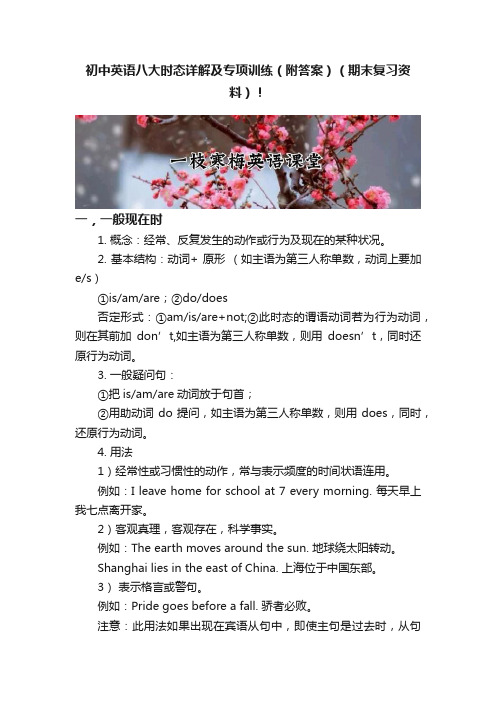
初中英语八大时态详解及专项训练(附答案)(期末复习资料)!一,一般现在时1. 概念:经常、反复发生的动作或行为及现在的某种状况。
2. 基本结构:动词+ 原形(如主语为第三人称单数,动词上要加e/s)①is/am/are;②do/does否定形式:①am/is/are+not;②此时态的谓语动词若为行为动词,则在其前加don’t,如主语为第三人称单数,则用doesn’t,同时还原行为动词。
3. 一般疑问句:①把is/am/are动词放于句首;②用助动词do提问,如主语为第三人称单数,则用does,同时,还原行为动词。
4. 用法1)经常性或习惯性的动作,常与表示频度的时间状语连用。
例如:I leave home for school at 7 every morning. 每天早上我七点离开家。
2)客观真理,客观存在,科学事实。
例如:The earth moves around the sun. 地球绕太阳转动。
Shanghai lies in the east of China. 上海位于中国东部。
3)表示格言或警句。
例如:Pride goes before a fall. 骄者必败。
注意:此用法如果出现在宾语从句中,即使主句是过去时,从句谓语也要用一般现在时。
例如:Columbus proved that the earth is round. 哥伦布证实了地球是圆的。
4)现在时刻的状态、能力、性格、个性。
例如:I don't want so much. 我不要那么多。
He writes good English but does not speak well.他英语写得不错,讲的可不行。
5)一般现在时表示将来含义。
a. 下列动词come, go, arrive, leave, start, begin, return的一般现在时可以表示将来,主要用来表示在时间上已确定或安排好的事情。
例如:The train leaves at six tomorrow morning. 火车明天上午六点开。

动词的时态和语态专项练习50题(附答案解析)一、单选题1.If it _______ rain tomorrow, we _______ go hiking.A.don't, will B.won't, are C.won't, will D.doesn't, will1.答案D解析句意:如果明天不下雨,我们就去远足。
这是if 引导的条件状语从句,满足“主将从现”,即主句用一般将来时,从句用一般现在时,故选D。
点评考查时态,本题涉及一般将来时和一般现在时。
2.We must hurry up. The last train ___________ in 10 minutes.A.is leaving B.leavesC.is about to leave D.Left2.答案A解析句意:我们必须快点。
最后一班火车10分钟后就要开了。
此处应表将来含义,如arrive,come,get (to),leave,return,start,travel,take,take off,fly,see off表示位置转移的动词(),用现在进行时(am/is are doing)表将来的含义,主要用于按计划或安排将要发生的动作或事件。
故选A。
点评考查时态,本题涉及现在进行时表将来。
3.—There __________ a basketball match in our school next Sunday.—Really? That's new to me.A.is going to have B.is going to beC.will have D.will to be3.答案B解析句意:——下星期天我们学校将有一场篮球赛。
——真的吗?我还不知道呢。
由时间状语next Sunday可知,空处谓语动词需用一般将来时;本句是there be句型,其将来时态为:There is going to be。
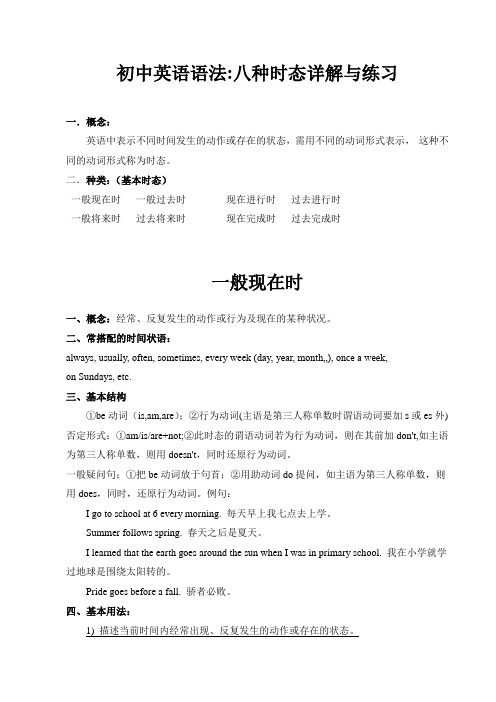
初中英语语法:八种时态详解与练习一.概念:英语中表示不同时间发生的动作或存在的状态,需用不同的动词形式表示,这种不同的动词形式称为时态。
二.种类:(基本时态)一般现在时一般过去时现在进行时过去进行时一般将来时过去将来时现在完成时过去完成时一般现在时一、概念:经常、反复发生的动作或行为及现在的某种状况。
二、常搭配的时间状语:always, usually, often, sometimes, every week (day, year, month…), once a week,on Sundays, etc.三、基本结构①be动词(is,am,are);②行为动词(主语是第三人称单数时谓语动词要加s或es外) 否定形式:①am/is/are+not;②此时态的谓语动词若为行为动词,则在其前加don't,如主语为第三人称单数,则用doesn't,同时还原行为动词。
一般疑问句:①把be动词放于句首;②用助动词do提问,如主语为第三人称单数,则用does,同时,还原行为动词。
例句:I go to school at 6 every morning. 每天早上我七点去上学。
Summer follows spring. 春天之后是夏天。
I learned that the earth goes around the sun when I was in primary school. 我在小学就学过地球是围绕太阳转的。
Pride goes before a fall. 骄者必败。
四、基本用法:1) 描述当前时间内经常出现、反复发生的动作或存在的状态。
在这种情景中,句子常带有表示频率的时间状语:always , everyday , often , once a week (month , year , etc.) , sometimes , seldom , usually等等,以表示句中的动作或状态是习惯性的、经常性的。



(英语)初中英语动词的时态专项训练及答案及解析(英语)初中英语动词的时态专项训练及答案及解析一、初中英语动词的时态1.---Have you ever been to Harbin?---Yes. I ________ there when I was twelve for the Ice and Snow Festival.A.have goon B.have been C.went D.had been【答案】C【解析】【详解】句意:——你曾经去过哈尔滨吗?——是的,当我十二岁的时候去了冰雪节。
这里是when引导的时间状语从句,主语用一般过去时态,这里用go的过去式went。
根据题意,故选C。
2.The life we were used to _______ greatly since 1992.A.change【答案】D【解析】试题分析:句意:我们过去的生活自从1992年后有了巨大的变化。
本题需要断句正确,we were used to作句子主语的定语,句子缺少谓语动词,根据时间状语since 1992,可知句子的谓语用现在完成时态,主语是the life用第三人称has changed,故选D。
考点:考查完成时态的用法。
B.XXX.—Could you tell me what he said just now?—Sorry, I ___ about what I would do tomorrow.A.will think【答案】B【剖析】【详解】句意:你能告诉我他刚才说什么吗?对不起,我正考虑明天我要做什么。
考查时态。
A. will think(普通将来时);B. was thinking (曩昔举行时);XXX(普通曩昔式);D. think(普通目前时);根据句意,“斟酌”这个举措产生适才在他发言的时候,在曩昔某个工夫点产生的举措用曩昔举行时,故选B。
B.XXX4.I_______this mobile phone online. It is not worth buying.A.XXX【答案】C【解析】【详解】句意:我在网上查过这部手机。

初中必备英语动词的时态技巧全解及练习题(含答案)含解析一、初中英语动词的时态1.The water dark and dirty. It’s no longer safe to drink.A.became B.will become C.has become D.was becoming【答案】C【解析】【分析】考点:考查动词时态。
【详解】试题分析:句意:水变得又脏又黑,已经不能继续安全饮用了。
根据It’s no longer safe to drink.可知,给现在带来的结果是不能饮用了,所以用现在完成时,表示过去的动作对现在的影响,故选C。
2.—May I speak to Mary?—Hold on, please.She_______in the kitchen.A.has cooked B.cooked C.will cook D.is cooking【答案】D【解析】句意:——我可以让玛丽接电话吗?——请不要挂断电话。
她正在厨房做饭。
根据Hold on, please.可知此处表示现在让对方别挂断电话,应是表示他找的玛丽正做某事,故用现在进行时be doing,故选D。
3.—I ________ you at seven and you didn’t pick up.—I was taking a shower at that time.A.call B.calledC.am calling D.have called【答案】B【解析】句意:——我七点钟打电话给你,你没接。
——那时我正在洗澡。
考查动词时态辨析题。
and连接并列结构,at seven在七点钟,是过去的时间,需用一般过去时,可排除ACD三项。
根据句意语境,可知选B。
4.---Helen, When did you moved here?---I______ here since two years ago.A.moved B.lived C.have moved D.have lived【答案】D试题分析:句意:―海伦,你什么时候搬到这儿的?―从两年前我就住在这儿。
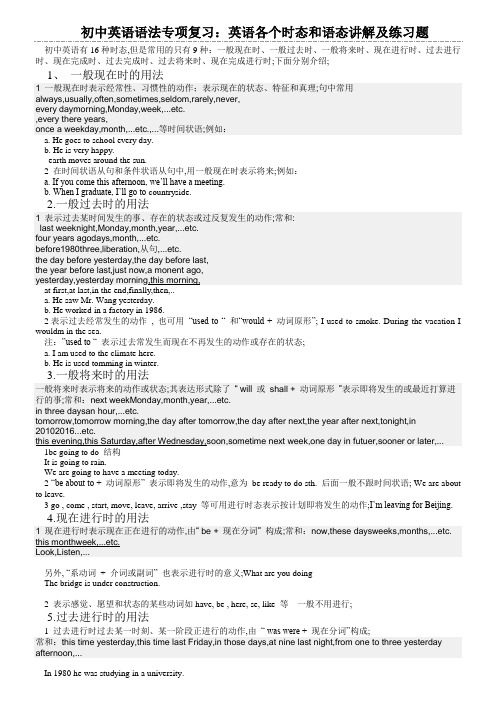
初中英语语法专项复习:英语各个时态和语态讲解及练习题初中英语有16种时态,但是常用的只有9种:一般现在时、一般过去时、一般将来时、现在进行时、过去进行时、现在完成时、过去完成时、过去将来时、现在完成进行时;下面分别介绍;1、一般现在时的用法1 一般现在时表示经常性、习惯性的动作;表示现在的状态、特征和真理;句中常用always,usually,often,sometimes,seldom,rarely,never,every daymorning,Monday,week,...etc.,every there years,once a weekday,month,...etc.,...等时间状语;例如:a. He goes to school every day.b. He is very happy.earth moves around the sun.2 在时间状语从句和条件状语从句中,用一般现在时表示将来;例如:a. If you come this afternoon, we’ll have a meeting.b. When I graduate, I’ll go to countryside.2.一般过去时的用法1 表示过去某时间发生的事、存在的状态或过反复发生的动作;常和:last weeknight,Monday,month,year,...etc.four years agodays,month,...etc.before1980three,liberation,从句,...etc.the day before yesterday,the day before last,the year before last,just now,a monent ago,yesterday,yesterday morning,this morning,at first,at last,in the end,finally,then,..a. He saw Mr. Wang yesterday.b. He worked in a factory in 1986.2表示过去经常发生的动作, 也可用“used to “ 和“would + 动词原形”; I used to smoke. During the vacation I wouldm in the sea.注:”used to “ 表示过去常发生而现在不再发生的动作或存在的状态;a. I am used to the climate here.b. He is used tomming in winter.3.一般将来时的用法一般将来时表示将来的动作或状态;其表达形式除了“ will 或shall + 动词原形”表示即将发生的或最近打算进行的事;常和:next weekMonday,month,year,...etc.in three daysan hour,...etc.tomorrow,tomorrow morning,the day after tomorrow,the day after next,the year after next,tonight,in 20102016...etc.this evening,this Saturday,after Wednesday,soon,sometime next week,one day in futuer,sooner or later,...1be going to do 结构It is going to rain.We are going to have a meeting today.2 “be about to + 动词原形” 表示即将发生的动作,意为be ready to do sth. 后面一般不跟时间状语; We are about to leave.3 go , come , start, move, leave, arrive ,stay 等可用进行时态表示按计划即将发生的动作;I’m leaving for Beijing.4.现在进行时的用法1 现在进行时表示现在正在进行的动作,由“ be + 现在分词” 构成;常和:now,these daysweeks,months,...etc. this monthweek,...etc.Look,Listen,...另外, “系动词+ 介词或副词” 也表示进行时的意义;What are you doingThe bridge is under construction.2 表示感觉、愿望和状态的某些动词如have, be , here, se, like 等一般不用进行;5.过去进行时的用法1 过去进行时过去某一时刻、某一阶段正进行的动作,由“ was were + 现在分词”构成;常和:this time yesterday,this time last Friday,in those days,at nine last night,from one to three yesterday afternoon,...In 1980 he was studying in a university.He was reading a novel when I came in.6.现在完成时的用法现在完成时由“have/has + 过去分词.其使用有两种情况:1 现在完成时所表示的动作在说话之前已完成,但对现在有影响;句中没有具体时间状语;常和:just,alreadly,yet,never,ever,now,before,this week,today,these days,once,twice,three times,...He has gone to Fuzhou.He has been to Fuzhou.2 现在完成时所表示的动作开始于过去,持续到现在,也许还会持续下去常用for 和since表示一段时间的状语或since then1949,last Monday,two o'clock,从句...,etc.,ever since then,for three daysa long time,two hours,...etc.so far , now, today, this wek month, year 等表示包括现在内的状语;He has studied English for 5 years.He has studied English since 1985.Now I have finished the work..注意:表示短暂时间动作的词如come, go , die, marry, buy 等的完成时不能与for, since 等表示一般时间的词连用;正确:I have bought the book already.错误:I have bought the book for two years.改:I have had the bookl for two years.7.过去完成时的用法1 过去完成时由“had + 过去分词”构成;过去完成时的动作表示过去某一时刻或某一时刻或某一动作之前完成的动作或状态;句中常用by then1977,yesterday,eight last night,the time we got there,...etc.by the end of last termweek,year,month,...etc..by, before, until, when 等词引导的时间状语;By the end of last year we had built five new houses.I had learnt 5000 words before I entered the university.2过去完成时的动词还可表示过去某一时刻之前发生的动作或状态持续到过去某个时间或持续下去;Before he slept, he had worked for 12 hours.8.过去将来时的用法过去将来时表示从过去的某个时间看来将要发生的动作或存在的状态;过去将来时由“should 或would + 动词原形” 构成;第一人称用should, 其他人称用would. ;常和:They were sure that they would succeed.二动词语态1.当句子的主语是动作的执行者时, 谓语的形式叫主动语态;句子的主语是动作承受者时,谓语的形式叫被动作语态;被动语态由助动词be + 过去分词构成,时态通过be 表现出来;1 一般现在时:You are required to do this.2 一般过去时:The story was told by her.3 一般将来时:The problem will be discussed tomorrow.4 现在进行时:The road is being widened.5 过去进行时:The new tool was being made.6 现在完成时:The novel has been read.7 过去完成时:He said that the work had been finished.8 过去将来时:He said that the trees would be planted soon.2. 一些特殊的被动结构1 带情态动词的被动结构:The problem must be solved soon.2 带不定式的被动结构:The room is going to be painted.The homework needs to be done with care.3 短语动词的被动:a.不及物动词+介词:若这类短语动词是及物性的,则可用于被动语态中,如:laugh at, look after, talk about, think of 等;若这类短语动词是不及物性的则不可用于被动语态中,如:book up, look down. 等b.及物动词+副词:bring about, carry out, find out, make out, put away, put off, take up, turn down, turn out, wipe out 等c. 动词+副词+介词:do away with, face up to, give into ,look down upon, make up with等d. 动词+名词+介词:catch sight of, keep on eye on, make a fool of , pay attention to , put an end to , set fire/light to , take notice of 等4 带复合宾语的动词在改为被动语态时,一般把主动结构中的宾语改为主语,宾语补足语保留在谓语后面;We always keep the classroom clean.比较:The classroom is always kept clean.5主动形式表示被动意义的词;常见的有:a.主动形式,这时动名词同句中的主语有动宾关系;The children need looking after.The windows wants /requires repairing.This point deserves mentioning.练习题1. It is a fine day. The sun __________shine brightly.2. They ___________visit the Science Museum next Sunday.3. Mr Brown________live in Beijing since he came to China.4. Mr Wang ________teach us English two years ago.5. The Smiths _______________ watch TV at this time last night.6. We __________learn about ten English songs by the end of last term.7. Father said that he ____________buy a new bike for me the next Friday.8. Bill isn¡¯t here. He ___________chat with his friends in the classroom.9. The teacher said that the moon __________go round the earth.10. The Young Pioneers will go to the zoo if it ____________not rain this Sunday.11. Listen They __________talk about the new film.12. Jim asked us what ___________happen in China in 1976.13. My mobile phone ___________steal on a bus last week.14. The host ____________interview the little boy just now.15. The Greens __________watch TV now.16. He said that he _____________ring me up when he got there.17. We ____________learn English for about three years.18. My brother_____________join the League in 1997.19. The farmers __________pick apples when I saw them.20. The red skirt __________cost the girl forty yuan.21. The film ____________begin when I got to the cinema.22. The girl told me that she wanted to be an English teacher when she _____grow up.23. My sister is a student and she _____________study at a middle school nearby.24. Mr Green __________travel to several places in South China since he came here.25. You _________catch the early bus if you get up early.26. _______you been________wear glasses all the time27. I’ll go home as soon as I _______finish my homework.29. Most science books are ______write in English.30. I ____________stay there for two months last year.31. Tell Lily to call me as soon as she _______.A. will arriveB. gets thereC. has goneD. reach here32. ----Hi, Kate. You look tired. What’s the matter ----I ______ well last night.A. didn’t sleepB. don’t sleepC. haven’t sleptD. won’t sleep33. ----Excuse me, look at the sign over there, please. Could you stop smoking----Sorry, I ____ that.A. didn’t seeB. don’t seeC. won’t seeD. can’t see34. ----Well, I found this. I think it must be yours. ----My watch Thank you. Where _____itA. do you findB. had you foundC. were you findingD. did you find35. ----Don you know when Dr White ____ for dinner this evening----No, but I think he ____ when he is free.A. will come; comesB. will come; will comeC. comes; comesD. comes; will come36. Look at those black clouds. It _____ rain. Let’s hurry. A. maybe B. would C. has D. is going to37. ----Jimmy is leaving for a holiday. ----Really Where ____ he ____A. has; goneB. will; goC. did; goD. does; go38. ----Shall we go shopping now ---Sorry, I can't. I ____ my shirts.A. washB. washesC. washedD. am washing39. ----I called you yesterday evening, but there was no answer.----Oh, I am sorry. I ___ dinner at my friend's home.A. haveB. hadC. was havingD. have had40. The Oriental Pearl TV Tower ____ thousands of visitors since 1995.A. attractedB. attractsC. has attractedD. will attract46. ----Why didn't you go to the cinema yesterday -----Because I ____ the film before.A. had seenB. have seenC. have watchedD. has watched47. I don't think John saw me. He ____ a book at that moment.A. just readB. has just readC. was just readingD. had just read48. Mr Smith ____ a book about China last year but I don't know whether he has finished it.A. has writtenB. wroteC. had writtenD. was writing49. Mr White ____ the newspaper while his daughter ____TV.A. has read; was watchingB. was reading; watchedC. was reading; was watchingD. reading; watched50. ---- I ____ you at the meeting. Why ----I was ill. A. saw B. have seen C. not see D. didn't see51. The 29th Olympic Games ____ in Beijing in 2008. A. hold B. will hold C. will be held D. held52. Hurry up The play ____ for ten minutes. A. has been on B. has begun C. had begun D. began53. ----May I speak to Mr Smith ----Sorry, he ____ Australia. But he ____ in two days.A. has been to; will come backB. has gone to; will be backC. has been in; would come backD. is leaving for; doesn't come back54. I can't go to the theater tonight because I ____ my ticket.A. have lostB. had lostC. will loseD. was losing55. ----What a nice bike How long ____ you ____ it ----Just two weeks.A. have; boughtB. did; buyC. have; hadD. are; having56. ----I'm sorry to have kept you waiting. ----Oh, not at all. I ____ here only for a few minutes.A. have comeB. had beenC. wasD. have been57. ----____ my dictionary anywhere ---- Yes. I saw it on your desk a moment ago.A. Did you seeB. If you seeC. Had you seenD. Would you see58. We were all surprised when he mad it clear that he ____ office soon.A. leavesB. would leaveC. will leaveD. had left答案:I. 1. shines/ is shining 2. are going to/ will visit 3. has lived 4. taught5. were watching6. had learned7. would buy8. is chatting9. goes 10.doesn't rain 11. are talking 12. happened 13. was stolen 14. interviewed15. are watching16. would ring 17. have learned 18. joined 19. were picking 20. cost21. had begun 22. grew 23. studies 24. has traveled 25. will catch26. Have; wearing 27. finish 28. haven't heard 29. written 30. stayedII. 31--35 BAADB 36--40 DBDCC 41--45 ACBAC 46--50 ACDCD51--55 CABAC 56--60 DABDA 61--65 BDBAB 66-70 BDABC 71--75 BCADD。

初中英语八大时态全套精讲及练习题.1 一般现在时的用法1)经常性或习惯性的动作,常与表示频度的时间状语连用。
时间状语: every…, sometimes,ofen,always,usually, twice a week, at…, on SundayI leave home for school at 7 every morning. He watches Tv once a week .2) 客观真理,客观存在,科学事实。
The earth moves around the sun. Shanghai lies in the east of China.3) 表示格言或警句中。
Pride goes before a fall. 骄者必败。
注意:此用法如果出现在宾语从句中,即使主句是过去时,从句谓语也要用一般现在时。
例:Columbus proved that the earth is round..4) 现在时刻的状态、能力、性格、个性。
I don't want so much.Ann Wang writes good English but does not speak well.比较:Now I put the sugar in the cup.I am doing my homework now.第一句用一般现在时,用于操作演示或指导说明的示范性动作,表示言行的瞬间动作。
再如:Now watch me, I switch on the current and stand back.第二句中的now是进行时的标志,表示正在进行的动作的客观状况,所以后句用一般现在时。
二. 构成及变化1、be动词的变化肯定句:主语+be(am,is,are)+其它。
如: I am a boy. 我是一个男孩。
否定句:主语+ be + not +其它。
如:He is not a worker. 他不是工人。
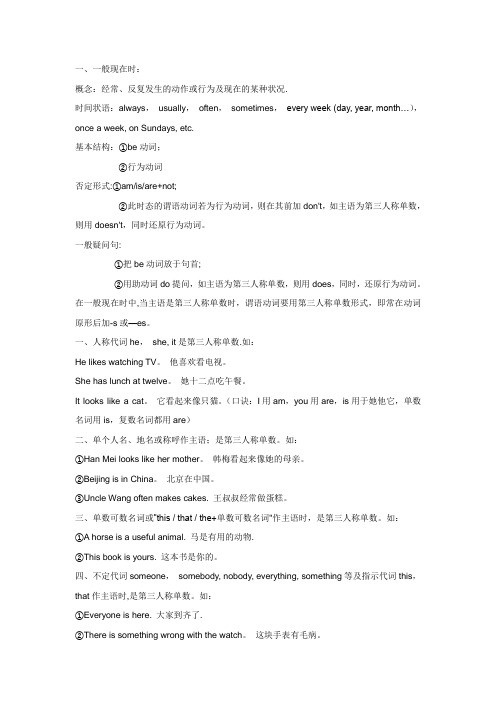
一、一般现在时:概念:经常、反复发生的动作或行为及现在的某种状况.时间状语:always,usually,often,sometimes,every week (day, year, month…),once a week, on Sundays, etc.基本结构:①be动词;②行为动词否定形式:①am/is/are+not;②此时态的谓语动词若为行为动词,则在其前加don't,如主语为第三人称单数,则用doesn't,同时还原行为动词。
一般疑问句:①把be动词放于句首;②用助动词do提问,如主语为第三人称单数,则用does,同时,还原行为动词。
在一般现在时中,当主语是第三人称单数时,谓语动词要用第三人称单数形式,即常在动词原形后加-s或—es。
一、人称代词he,she, it是第三人称单数.如:He likes watching TV。
他喜欢看电视。
She has lunch at twelve。
她十二点吃午餐。
It looks like a cat。
它看起来像只猫。
(口诀:I用am,you用are,is用于她他它,单数名词用is,复数名词都用are)二、单个人名、地名或称呼作主语;是第三人称单数。
如:①Han Mei looks like her mother。
韩梅看起来像她的母亲。
②Beijing is in China。
北京在中国。
③Uncle Wang often makes cakes. 王叔叔经常做蛋糕。
三、单数可数名词或”this / that / the+单数可数名词"作主语时,是第三人称单数。
如:①A horse is a useful animal. 马是有用的动物.②This book is yours. 这本书是你的。
四、不定代词someone,somebody, nobody, everything, something等及指示代词this,that作主语时,是第三人称单数。

(完整版word)英语动词的时态专项及解析含答案解析一、初中英语动词的时态1.–Don’t worry! I’m sure your son will arrive safely.-- But if he ______, what can I do? It’s getting dark and it’s going to rain.A.won’t come B.doesn’t come C.isn’t coming D.wouldn’t come【答案】B【解析】【详解】句意“-不要担心,我确信你的儿子将会安全到达。
-但是如果他没到,我该如何做?现在天要黑了,而且要下雨了”。
根据句意可知,此处的if译为“如果”,且主句表示将来,从句用一般现在时,且从句谓语为实意动词,故选B。
2.I think I _ my new project tomorrow.A.start B.started C.will start D.was starting【答案】C【解析】句意:我想我明天将要开始我的新项目。
本题考查动词的时态。
A. start 开始,是动词原形 B. started 开始,是动词的过去式 C. will start 将要开始,是动词的将来时 D. was starting就要开始,是过去将来时。
根据句意选C。
3.— Hello! May I speak to Mary, please?— Sorry. She _________ a shower now.A.has B.hadC.will have D.is having【答案】D【解析】句意:喂,请找玛丽接电话好吗?对不起,她正在洗澡。
本题考查动词的时态。
Have a shower洗澡。
A. has 单数第三人称形式 B. had 一般过去时 C. will have一般将来时 D. is having现在进行时。
根据题意“她现在正在洗澡”是现在正在进行的动作,故选D。

英语时态知识梳理知识梳理知识点1 时态一般现在时1.一般现在时的用法1) 经常性的动作用于说明一个经常性、习惯性的动作。
这时句中常用often, usually, every day, sometimes等时间状语。
He goes to school at six every day.2)现在的状态和主语的特征We like surfing the Internet in our spare time.3) 事实和真理表示现在的状态、特征和按常理应该存在的情况,表示普遍真理或客观事实。
My parents live in a village near Shanghai.In autumn, leaves change from green to yellow.4) 代替将来时在时间状语从句和条件状语从句中,用一般现在时代替一般将来时:在由 when, after, before, until, till, as soon as等引导的时间状语中由 if, unless等引导的条件状语从句中If you come this afternoon, we’ll have a meeting.2. 一般现在时常用的时间状语:通常与表示频度的副词如 often, sometimes, usually, always 等和时间状语如 in the evening, at night, twice a month, every day / week / month / year, on Sundays 等连用。
一般过去时1. 一般过去时的用法1) 表示过去某一时刻或某一段时间内所发生的动作或情况,通常一般过去时带有表示动作时间状语的词,词组或从句,He lived in Paris until he was ten.2) 配合时态上的一致,用过去时。
He told me his mother was ill.2.一般过去时常用的时间状语yesterday, the day before yesterday, last week, 过去具体时间点at that time, then, at that moment,yesterday morning (afternoon, evening…), last night (week, month, year…), 一段时间 + ago(several days ago), two days ago, a week ago, three years ago, in 1990,just now一般将来时1.一般将来时的构成 will/be going to +动词原形2. 一般将来时的用法1) will/won’t表示预测的将来,即认为某事肯定会发生;还可表示将来的意愿;将来的事实。

初中英语语法:八种时态详解与练习一.概念:英语中表示不同时间发生的动作或存在的状态,需用不同的动词形式表示,这种不同的动词形式称为时态。
二.种类:(基本时态)一般现在时一般过去时现在进行时过去进行时一般将来时过去将来时现在完成时过去完成时一般现在时一、概念:经常、反复发生的动作或行为及现在的某种状况.二、常搭配的时间状语:always, usually, often, sometimes, every week (day, year, month…), once a week,on Sundays, etc。
三、基本结构①be动词(is,am,are);②行为动词(主语是第三人称单数时谓语动词要加s或es外)否定形式:①am/is/are+not;②此时态的谓语动词若为行为动词,则在其前加don't,如主语为第三人称单数,则用doesn't,同时还原行为动词.一般疑问句:①把be动词放于句首;②用助动词do提问,如主语为第三人称单数,则用does,同时,还原行为动词。
例句:I go to school at 6 every morning. 每天早上我七点去上学。
Summer follows spring. 春天之后是夏天。
I learned that the earth goes around the sun when I was in primary school。
我在小学就学过地球是围绕太阳转的。
Pride goes before a fall。
骄者必败。
四、基本用法:1)描述当前时间内经常出现、反复发生的动作或存在的状态。
在这种情景中,句子常带有表示频率的时间状语:always , everyday , often , once a week (month , year , etc.), sometimes , seldom , usually等等,以表示句中的动作或状态是习惯性的、经常性的。
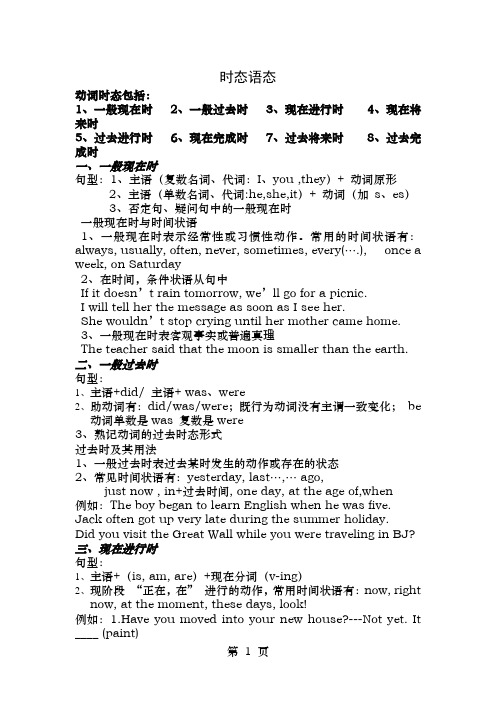
时态语态动词时态包括:1、一般现在时2、一般过去时3、现在进行时4、现在将来时5、过去进行时6、现在完成时7、过去将来时8、过去完成时一、一般现在时句型:1、主语(复数名词、代词:I、you ,they)+ 动词原形2、主语(单数名词、代词:he,she,it)+ 动词(加s、es)3、否定句、疑问句中的一般现在时一般现在时与时间状语1、一般现在时表示经常性或习惯性动作。
常用的时间状语有:always, usually, often, never, sometimes, every(….), once a week, on Saturday2、在时间,条件状语从句中If it doesn’t rain tomorrow, we’ll go for a picnic.I will tell her the message as soon as I see her.She wouldn’t stop crying until her mother came home. 3、一般现在时表客观事实或普遍真理The teacher said that the moon is smaller than the earth.二、一般过去时句型:1、主语+did/ 主语+ was、were2、助动词有:did/was/were;既行为动词没有主谓一致变化;be动词单数是was 复数是were3、熟记动词的过去时态形式过去时及其用法1、一般过去时表过去某时发生的动作或存在的状态2、常见时间状语有:yesterday, last…,… ago,just now , in+过去时间, one day, at the age of,when例如:The boy began to learn English when he was five. Jack often got up very late during the summer holiday.Did you visit the Great Wall while you were traveling in BJ?三、现在进行时句型:1、主语+(is, am, are)+现在分词(v-ing)2、现阶段“正在,在” 进行的动作,常用时间状语有:now, rightnow, at the moment, these days, look!例如:1.Have you moved into your new house?---Not yet. It ____ (paint)2.Look there! Ma Ning ______(play) basketball alone.四、现在将来时句型:1、主语+will do…or will be…主语+ (is am are) going…2、有些动词象:go, come, arrive, leave,start, die 等表示移动的动词,它们的进行时态形式表示将来The Greens are leaving for Shanghai tomorrow.3、一般将来时表示“将,将要”来要发生的动作或状态,常用时间状语有:tomorrow, this afternoon , next week, in+一段时间五、过去进行时句型:1、was/were + doing…2、过去某个“时间点” “正在,在” 进行的动作3、时间状语有:at seven yesterday morning, from 9 to 10 last night, at this time last Monday, when、while等例如:I was watching TV when my teacher came to my home.He was drinking with us when the killing happened.It was 8:00 now, and he was having his breakfast.六、现在完成时1.现在完成时:顾名思义,现在完成时表示的是已经完成的动作,但动作造成的影响还在,常被just,already,yet 等副词修饰。
初中英语时态详解及专项练习专题一、写出下列动词的现在分词:play______run__________swim________make____ ___go________like________write________ ski_______read________have_______sing___ ____dance_______put______see_____buy______love__________live_______take________ come________get________stop________sit________begin________shop__________二、用所给的动词的正确形式填空:1.The boy __________________ ( draw)a picture now.2. Listen .Some girls __________( sing)in the classroom .3. My mother ____________ ( cook )some nice food now.4. What _____ you ______ ( do ) now?5. Look . They _____________( have) an English lesson .6.They ____________(not ,water) the flowers now.7.Look! the girls ____________(dance )in the classroom .8.What is our granddaughter doing?She _________(listen ) to music.9. It's 5 o'clock now. We ___________(have)supper now10.______Helen__________(wash )clothes? Yes ,she is三、句型转换:1. They are doing housework .(分别改成一般疑问句和否定句)①_______________________________________________②_______________________________________________2.The students are cleaning the classroom . ( 改一般疑问句并作肯定和否定回答)①_______________________________________________②_ ___________________________________③_____________________________3.I'm playing the football in the playground .(改为否定句)________________________________________________4.Tom is reading books in his study . (改为一般疑问句)________________________________________________5. My mother is cooking some nice food now. ( 改一般疑问句并作肯定和否定回答)①_______________________________________________②_ ___________________________________③_____________________________6.They are not watering the flowers now. (改为肯定句)初中英语时态详解及专项练习专题一、写出下列动词的现在分词:play______run__________swim________make____ ___go________like________write________ ski_______read________have_______sing___ ____dance_______put______see_____buy______love__________live_______take________ come________get________stop________sit________begin________shop__________二、用所给的动词的正确形式填空:1.The boy __________________ ( draw)a picture now.2. Listen .Some girls __________( sing)in the classroom .3. My mother ____________ ( cook )some nice food now.4. What _____ you ______ ( do ) now?5. Look . They _____________( have) an English lesson .6.They ____________(not ,water) the flowers now.7.Look! the girls ____________(dance )in the classroom .8.What is our granddaughter doing?She _________(listen ) to music.9. It's 5 o'clock now. We ___________(have)supper now10.______Helen__________(wash )clothes? Yes ,she is三、句型转换:1. They are doing housework .(分别改成一般疑问句和否定句)①_______________________________________________②_______________________________________________2.The students are cleaning the classroom . ( 改一般疑问句并作肯定和否定回答)①_______________________________________________②_ ___________________________________③_____________________________3.I'm playing the football in the playground .(改为否定句)________________________________________________4.Tom is reading books in his study . (改为一般疑问句)________________________________________________5. My mother is cooking some nice food now. ( 改一般疑问句并作肯定和否定回答)①_______________________________________________②_ ___________________________________③_____________________________6.They are not watering the flowers now. (改为肯定句)现在进行时态提高题一.填空题1.Mr Zheng _______________ (read) a book now.2. The rabbits _________________ (jump) now.3.. Look ! Tom and John ________________ (swim).4. My brother _________________ (make) a kite in his room now.5. Look! The bus _______________ (stop).6. We _______________ (have) an English class now.7. Listen! Someone is__________________(come).8. They ___________________(catch) butterflies now.9. He ______________________ (do) an experiment now.10. They _____________________(collect) stamps now.11. Look! He _________ (dive) now.12. Tom __________________ ( watch ) TV in the dining room.13. The doctors _____________________ (get ) off the bus.14. Come on. They _________________ ( leave ) now.15. It _______________________ (eat) fish now.16. My father __________________(work) in the office now.17. Where is your mother?She ________________________ (answer) the phone.18. The teachers ________________ (run) now.二、按要求改写句子1. The boy is playing basketball.否定句:____________________________一般疑问句:_________________________肯定回答:__________________________否定回答:__________________________对The boy提问:__________________________2. 造句:1).she,the window,open,now.(用现在进行时连词成句.)_________________2).is,who,the window,cleaning?(连词成句)______________________3).She is closing the door now.(改成否定句)______________________4.)You are doing your homework.(用"I"作主语改写句子)_______________5).they,the tree,sing,now,under.(用现在进行时连词成句.)______________6).The Young Pioneers are helping the old woman.(改成一般疑问句)__________三、用现在进行时完成下列句子:1.What_________you__________(do)?2.I_____________(sing) an English so ng.3.What________he____________(mend)?4.He______________(mend) a car.5.______you__________(fly) a kite?Yes,_______.6.______she___________(sit) in the boat?7.______you_____________(ask) q uestions?8.We_______________(play) games now.四。